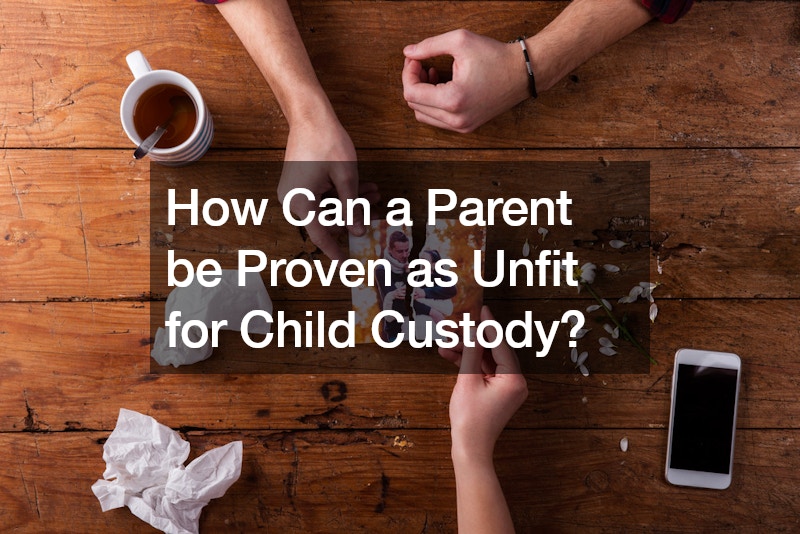

How Can a Parent Be Proved Unfit for Child Custody?
When embroiled in a custody battle, demonstrating that the other parent is unfit can be both challenging and essential if it is in your child’s best interest. Courts prioritize the child’s welfare and best interests, and proving unfitness involves addressing several key factors. Here, we outline these critical areas, provide detailed examples, and offer practical advice on how to strengthen your case.
1. Substance Abuse
Substance abuse is a serious concern in custody cases because it can severely impact a parent’s ability to provide a safe and stable environment for their child. This includes both illegal drug use and the misuse of prescription medication.
Examples:
- Chronic Substance Abuse: If the other parent has a long history of substance abuse, document the frequency and nature of their addiction. For instance, if the parent has repeatedly gone through cycles of rehabilitation and relapse, this demonstrates instability.
- Current Substance Abuse: Even without a long history, current substance abuse is relevant. For example, if the parent is currently using drugs or alcohol excessively, document instances such as arrests for DUI, visible intoxication while caring for the child, or frequent hospital visits for overdoses.
What to Do:
- Request Drug Tests: Petition the court for regular drug testing of the other parent. Positive tests, refusals, or attempts to tamper with the tests can serve as compelling evidence.
- Document Behavior: Keep a detailed log of any behavior that indicates substance abuse, such as erratic behavior, missed visitations, or neglectful conduct.
- Substance Abuse Programs: Suggest that the court orders the other parent to undergo a substance abuse assessment and follow any recommended treatment programs. This can include mandatory participation in rehabilitation or counseling sessions.
2. Neglect
Neglect refers to the failure to provide for a child’s basic needs, including food, shelter, education, and medical care. Demonstrating a pattern of neglect can significantly impact a court’s decision on custody.
Examples:
- Inconsistent Care: Show that the child often appears tired, dirty, or hungry. This might involve collecting testimonies from teachers or caregivers who have observed the child arriving at school without proper clothing or lunch.
- Educational Neglect: Provide evidence that the child frequently misses school, arrives late, or is unprepared. Obtain school records or statements from educators that highlight the child’s irregular attendance and poor academic performance.
-
Medical Neglect: Document any instances where the child has missed medical appointments or has untreated illnesses. Medical records indicating neglectful care are crucial.
What to Do:
- Maintain Detailed Records: Keep a journal documenting all instances of neglect. Note specific dates, times, and descriptions of the child’s condition.
- Gather Witness Statements: Collect testimonies from teachers, doctors, and other caregivers who can provide firsthand accounts of the neglect.
- Report Severe Cases: In extreme cases, report the neglect to child protective services to create an official record of the neglectful behavior.
3. Abuse
Abuse, whether physical, emotional, or psychological, is a critical factor in determining parental fitness. Courts take allegations of abuse very seriously and will thoroughly investigate any credible evidence presented.
Examples:
- Physical Abuse: Provide police reports, medical records, or photographs that document physical injuries such as bruises or broken bones. Evidence of physical abuse from credible sources like doctors or police officers carries significant weight.
- Emotional Abuse: Collect statements from counselors or psychologists who have evaluated the child and can testify to the emotional or psychological harm caused by the other parent’s behavior.
- Documented History: Use records such as child protective services reports, protection orders, or past criminal convictions to establish a pattern of abusive behavior.
What to Do:
- Immediate Reporting: Report any abuse to authorities immediately to ensure it is documented.
- Collect Comprehensive Evidence: Gather all relevant legal documents, medical records, and witness statements related to the abuse.
- Professional Evaluations: Seek evaluations from mental health professionals who can assess and testify to the impact of the abuse on the child.
Maximizing Your Chances of Getting Custody
- Work with a Custody Attorney:
- A custody attorney can help you navigate the legal system, gather evidence, and present a compelling case to the court. Their expertise is invaluable in formulating a strategy that aligns with legal standards and expectations.
- Document Everything:
- Keep thorough and accurate records of all incidents that demonstrate the other parent’s unfitness. Include specific details such as dates, times, and descriptions of each incident to create a comprehensive and credible case.
- Gather Supporting Evidence:
- Collect a wide range of evidence, including medical records, school reports, police reports, and witness statements. The more detailed and varied your evidence, the stronger your case will be.
- Maintain Your Conduct:
- Stay focused on your child’s well-being and avoid engaging in conflict with the other parent. Demonstrate your own fitness as a parent by providing a stable, loving, and supportive environment for your child.
- Consider Professional Evaluations:
- Psychological evaluations and home studies can provide objective evidence of both parents’ fitness. These assessments are highly persuasive and can significantly influence the court’s decision.
Proving a parent unfit for child custody requires clear, compelling evidence and a strategic approach. By focusing on substance abuse, neglect, and abuse, and by working closely with a custody attorney, you can build a strong case to protect your child’s best interests. Remember to document everything meticulously, gather comprehensive evidence, and maintain your own exemplary conduct throughout the process. With these strategies, you can maximize your chances of securing the custody arrangement that best serves your child’s needs.
.


